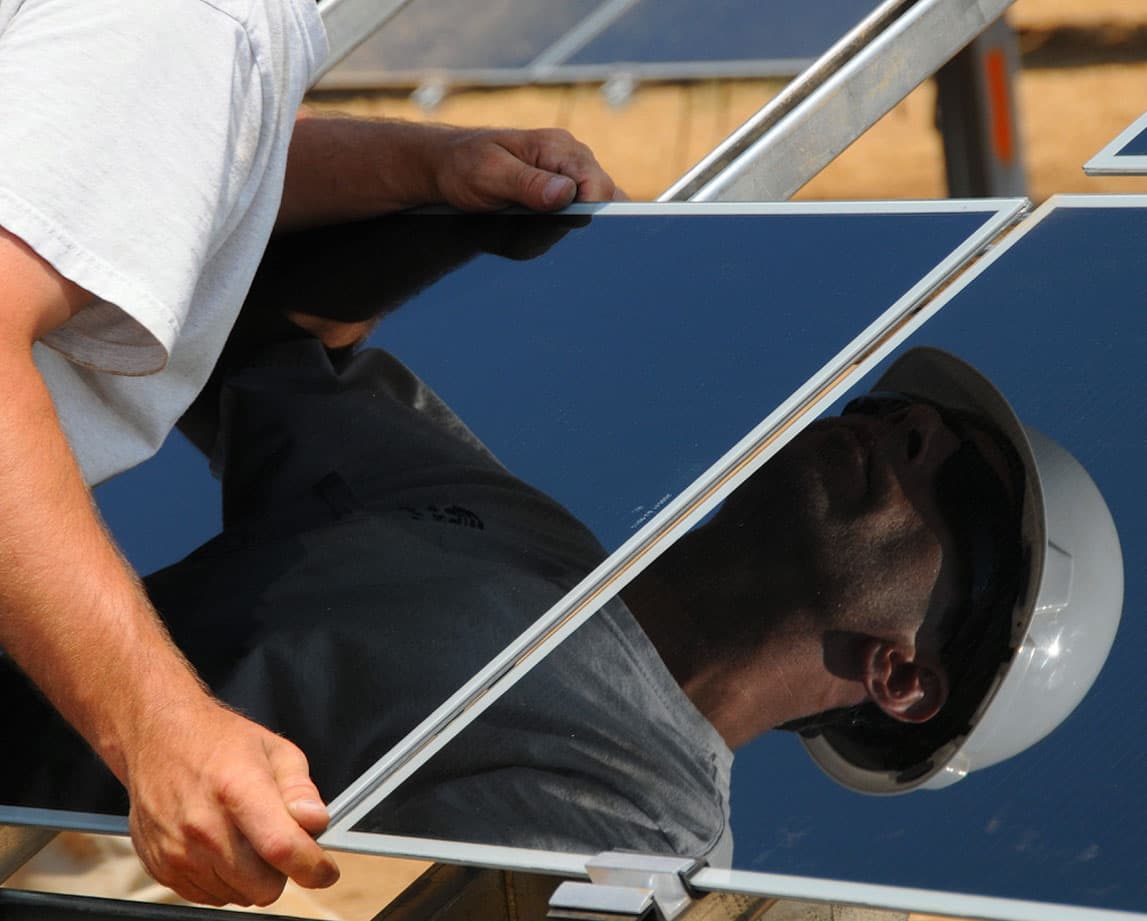Table of contents
Tips to Maximize Your Solar Energy System
Solar Energy: Pros, Cons, and How to Maximize Solar Efficiency
Why Solar Might be Right for You
Whether Your Solar System will be Installed in an Urban or Rural Area
Whether You Live in an Area with Temperate Climates
Whether You Want to Reduce Your Carbon Footprint
The Best Way to Implement a Solar Strategy

Sustainable energy is the future, and it can pay dividends if you know how to use it wisely. Verde Solutions’ experts entertain hundreds of questions from residents and business owners about whether solar energy is a good investment for them.
This post will outline ways to use solar power to save you hundreds of dollars on your power bills. These solar power-saving tips help our commercial clients stay competitive. With our advice, you can make the most out of your solar installation, running on clean, renewable energy that keeps costs low and profits up.
Summary
- Keep solar panels clean to maximize energy production, utilize federal tax credits and state utility rebates, and remove shading to optimize solar system performance.
- Solar panels are a safe investment with excellent longevity.
- Whether your solar system will be installed in an urban or rural area, the climate of your location and your desire to reduce your carbon footprint are important factors to consider.
Solar Power Reduces Commercial Energy Costs
A solar energy system can significantly reduce the amount of electricity a business pulls from the power grid, reducing supply charges or the total kilowatt-hours (kWh) or megawatt-hours (MWh) it consumes. In addition, solar panels provide a hedge against rising energy costs, so future rate hikes have much less impact. This helps make the business environment more certain, especially because it has been so unpredictable in the last few years.
Also, demand charges cause many businesses to have high energy bills. Demand charges are a component of commercial electricity bills that correspond with the highest energy use periods and are usually assessed in short blocks, like 15 to 30 minutes. Demand charges can significantly inflate total energy bills for businesses with energy consumption that peaks and dips during the day.
However, many businesses cannot shift when they consume power, but solar electricity can often offset demand charges, especially when the periods of highest energy use are during daylight hours. Consuming solar electricity instead of grid power during high periods can shave down the peak by replacing it with solar power. The result is lower operating expenses for decades.
Tips to Maximize Your Solar Energy System
According to the International Energy Agency, solar energy, which now accounts for about 5% of electricity generation in the US, will provide about 20% by 2050. Whether you’ve already installed solar panels for your business or are still considering it, you should read the latest evidence-based information on maximizing saving with your solar system.
Here are a few solar power tips you can use to maximize performance:
- Keep your solar panels clean by removing dust or animal droppings that accumulate on them over time. According to the National Renewable Energy Laboratory, clean panels provide as much as 7% more energy.
- Utilize federal tax credits and state utility rebates. The Department of Energy regularly creates programs that help investors save as much as 26% on their solar panel installation costs.
- Remove trees and combat other sources of shade by investing in microinverters or a string inverter. The output of your entire array could decline if a part of the panel is under a shadow.
Solar Energy: Pros, Cons, and How to Maximize Solar Efficiency
New solar methods seem to come about every two to three years, and while not all of them are revolutionary, they help scientists to refine and rethink how we can use the sun to generate renewable power.
Pros
Solar Panels are a Safe Investment
If you want to optimize your residential or commercial energy grid, investing in solar power has never been more risk-free than it is right now. Solar panels provide excellent longevity, paying for themselves over time.
The expected lifespans of current models exceed 30 years. According to market research, ROI for a residential PV system averages at about 20% after one year.
Solar Panels Can Help You Save Power in All Weather Conditions
One of the most prevalent myths about solar panels is that they can’t produce power in colder climates or under heavy cloud cover. However, UV rays penetrate the clouds and allow solar panels to work just as efficiently as direct sunlight. Even models from the late 90s can produce large amounts of energy in low-light conditions.
Solar Panels Help Your Property Appreciate in Value
Research from the Lawrence Berkeley Laboratory reveals that buildings with a photovoltaic installation appreciate better than those that purely rely on the local grid. Statisticians found that a PV system adds $15,000 in real estate value on average, making second-hand houses and commercial structures more marketable and easier to sell. It also means that solar panels provide an instant return on investment for cautious buyers.
Additional Read: Solar Power – One Of The Best Energy Solutions For Saving Our Future
Cons
Solar Panels Can Not Generate Power at Night
Engineers design solar panels to deliver electricity in real time to an active grid or a battery for temporary storage. The panels can’t generate power from moonlight, so they are not an ideal solution for people who want to go off the grid completely. This also means that most of your power savings stop when the sun sets.
Solar Panels Can Detract from Curb Appeal
Most entry-level solar panels will not sit flush with your roof tiles and domes. Their obtrusive appearance can affect how your home or neighborhood looks from the street, potentially bringing down curb appeal. Homes with poor curb appeal can be more challenging to sell, but as solar panels become more widespread, future buyers might perceive them as a regular part of American homes, public buildings, and private businesses.
Solar Panel Reliability
While solar panels are generally reliable, their efficacy can wane depending upon the climate they face. PV installations can survive most adverse weather events, including torrential rains, high levels of humidity, and significant temperature fluctuations. However, PV panels in coastal towns might have shorter lifespans because of higher aerial salt levels, which corrode silicon, steel, and iron at faster rates.
Also, solar panels’ efficiency decreases the higher the temperature becomes. Like many machines, solar panels face difficulty when exposed to constant high heat. That said, leaving space between the panels and the roof for airflow can alleviate this concern.
Why Solar Might be Right for You
While installing solar panels is one of the best cost-saving options for conscientious and eco-friendly investors, it’s not a one-size-fits-all solution. Solar cells require a sizeable initial investment, and it pays off slowly for people who live in areas with cheap electricity. You will find no shortage of creative ways to use solar power online, but here are the factors that will determine whether it’s right for you:
Whether Your Solar System will be Installed in an Urban or Rural Area
According to the American Community Survey, people in urban areas tend to pay less for power than small rural communities, but they also consume more power. Electric vehicles, sizeable commercial power demand, and higher tax incentives make batteries more affordable and solar services more accessible.
People in rural lands can create large private solar farms with ample square footage at their disposal. However, maintenance and parts might be more expensive, limiting which businesses can afford the investment.
Whether You Live in an Area with Temperate Climates
Solar panels can survive harsh weather, but hail, sleet, and heavy snow can damage them and lower their efficiency.
Whether You Want to Reduce Your Carbon Footprint
Private solar installations reduce the workload of industrial farms that degrade land and destroy animal habitats in a few corridors of the United States. Going solar will not only reduce your carbon footprint but also help make solar energy more sustainable in general.
The Best Way to Implement a Solar Strategy
New developments change how people maximize their solar panels. For example, getting new, more efficient panels could make sense instead of installing accessories on old models from the 90s. Learning how to save solar energy is not a one-and-done deal but a continuous process that evolves far beyond the initial investment.
Here’s a great solar strategy simplified:
- Look for roofs that slope between 10 and 45 degrees, facing south.
- Ensure your roof will need minimal repairs and replacement over the lifespan of your panels.
- Hire a NABCEP-certified contractor for installation.
For more information on how to save solar energy, ways to use solar power, and solar power-saving tips, contact our experts at Verde Solutions by calling 800-541-1137.

